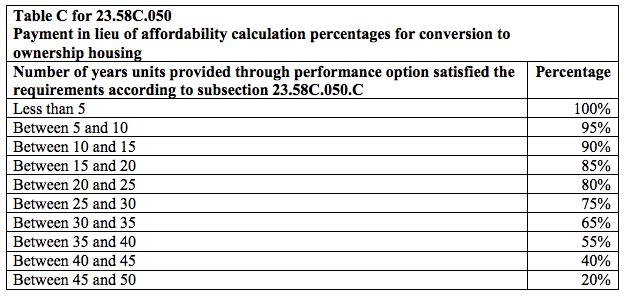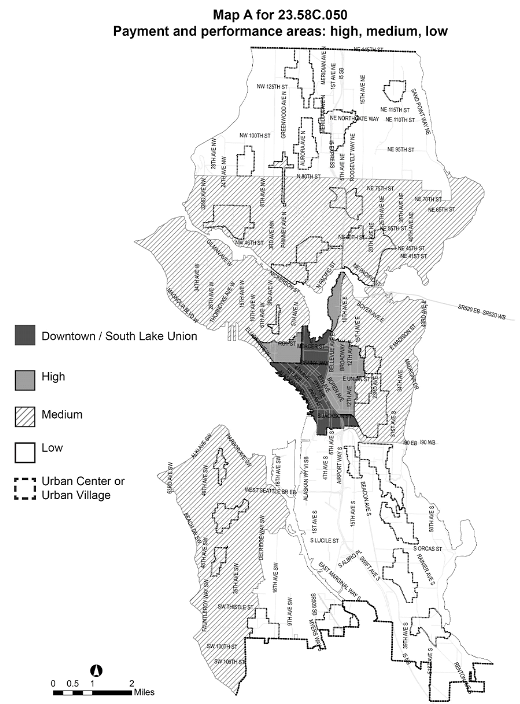If you’ve been following Seattle’s Mandatory Housing Affordability process since the beginning, then you know that, so far, the City has adopted a framework for mandatory affordable housing requirements for new commercial development (MHA-C). That framework, however, has not yet been implemented. Two things must occur first: for one, the City Council must adopt a companion framework for mandatory affordable housing requirements for new multi-family residential development (MHA-R); for another, the City Council must adopt rezones that increase development capacity through additional allowed FAR and building heights.
For the past two months, the legislation establishing the MHA-R framework has been under deliberations by the Planning, Land Use, and Zoning (PLUZ) Committee. The legislation got as far as a public hearing in mid-June. Then in mid-July, Committee Chair Rob Johnson introduced a substitute version of legislation replacing the proposed ordinance. That substitute legislation essentially made three primary changes:
- Clarifying that contract rezones–a site-specific rezone proposed by an applicant for a development and compliant with the type and amount of development envisioned by the Comprehensive Plan–is subject to the MHA program;
- Allowing the Seattle Department of Construction and Inspections (SDCI) to establish cash payment and on-site affordable housing requirements for contract rezones; and
- Adding required cash payments due for off-site affordable housing if a rental development converted to individual ownership units during the initial 50-year affordable housing period.

As the legislation moves forward, members of the City Council are now proposing 11 different amendments to MHA-R legislation. These are summarized as follows:
- An amendment co-sponsored by Councilmembers Lisa Herbold and Mike O’Brien would modify the City Council’s intent in setting the initial cash payment and on-site affordable housing performance amounts required under the MHA-R program. As drafted, the legislation would not set initial rates for zones when adopted. Instead, rates would be set when specific rezones increase development capacity. The amendment by Councilmembers Herbold and O’Brien would do two things. Firstly, it would allow the City to consider higher cash payment and on-site affordable housing amounts for areas that are identified as having a high risk of displacement. Secondly, it would allow the City to require consider additional MHA-R requirements or an alternative scheme to compensate for displacement resulting from demolition of affordable units (e.g., one-for-one replacement of “naturally affordable units”). Those requirements won’t be set by the initial MHA-R framework legislation. Instead, they would be analyzed and added through rezones. The Councilmembers’ language would give the City Council greater latitude for specific areas proposed for rezones. Passed.

Cash payment option rates are reserved in the proposed legislation until future rezones establish them. (City of Seattle) - An amendment co-sponsored by Councilmembers Rob Johnson and Mike O’Brien would amend the proposed intent section that establishes annual reporting requirements on the MHA-R program and would be the basis for future amendments to the implementation program of payment and performance amounts. The Councilmembers’ amendment would essentially require SDCI to analyze the choices of developers in MHA-R participation outside of Downtown and South Lake Union. SDCI would have to report on actual and modeled MHA-R program participation for those areas. Passed.
- The MHA-R legislation establishes four factors for using cash contributions to the MHA-R program for affordable housing. Those include “affirmatively furthering fair housing choice,” locating housing with an urban center or urban village, locating housing near high quality transit (e.g., frequent bus or light rail), and promoting economic opportunity in communities, particularly those areas prone to displacement. Councilmember Rob Johnson’s amendment would encourage affordable housing derived from such cash contributions to be located near new development that generated the cash contributions in the first place. In other words, Councilmember Johnson doesn’t want to see new development in Downtown, for instance, contributing to affordable housing in Bitter Lake or vice versa; he wants affordable housing to go back to the communities where the money is coming from. Passed.
- The proposed MHA-R legislation would set a minimum requirement of 50 years for the development of on-site affordable housing. Developers who elect to create on-site affordable housing would have two options: affordable rental units and affordable ownership units. Both options would subject to the 50-year affordability requirements. Councilmember Rob Johnson, however, is proposing to extend the period of required affordable housing to 75 years. Passed.
-

Map of payment and performance areas by generalized rating. (City of Seattle) As proposed, new development subject to affordable housing requirements would be broken up by cash payments or on-site affordable housing amounts by a map identifying areas as “low,” “medium,” and “high.” Since the actual amounts and actual policy goals for mitigating displacement have yet to be determined, Councilmember Mike O’Brien thinks it is too early to establish a map. His amendment would strike it from the MHA-R legislation. Passed.
- Under the on-site affordable option, developers can initially choose to provide units in a building as rental units during the 50-year affordability time period. However, a building owner could eventually choose to convert the building during that 50-year time period to individual ownership of units. If that occurred, affordable rental units would have to be converted to affordable ownership units. Councilmember Lisa Herbold proposes an amendment to the language would make it clear that any current tenant of affordable rental unit being converted to an affordable ownership unit would be given first right to an offer on the affordable ownership unit. Passed.
- Councilmember Lisa Herbold is also proposing a new section that would require the Director of the Office Housing to deliver a report in 2017 that analyzes best practices for ensuring ongoing affordability of ownership units. Passed.
- The proposed MHA-R legislation would require an annual fee of $600 per on-site affordable ownership unit to be paid to the Office of Housing in order to monitor compliance with requirements. Councilmember Lisa Herbold proposes to strike the specified fee in favor of allowing the Director of the Office of Housing to determine the fee amount and allow monthly payment of the fee instead of one annual lump sum. Passed.
- Councilmember Lisa Herbold proposes a policy change for cost recovery of marketing the sale of affordable ownership units and screening and selecting candidate households. Instead of allowing partial recovery of costs, Councilmember Herbold would require full cost recovery in the Office of Housing’s oversight in affordable ownership unit resales. Passed.
- The MHA-R legislation, as proposed, does not allow an option for converting affordable rental units to affordable ownership units. Instead, building owners who might convert from rental units to ownership units would be required to pay cash contributions for off-site affordable housing at the rate originally applicable to the building’s original building permit plus the adjusted inflation over the time period. Councilmember Lisa Herbold would give building owners an alternative on-site option. Building owners could simply retain on-site affordable rental units as on-site affordable ownership units. Passed.
- Requirements for cash contributions and on-site affordable housing under the MHA-R program may be modified under current and proposed law. A proposed amendment would change the process in determining the modifications. Essentially, all modifications would have to come as an administrative land use decision by SDCI, subject to public notice and comment, and which may be appealed to the Hearing Examiner by any aggrieved party with standing. Passed.
The City Council will take up discussion on these amendments and the MHA-R legislation as a whole today at the 9.30am PLUZ Committee. We’ll update this post later today on the outcome.
UPDATE: The PLUZ Committee convened on Tuesday with Councilmembers Rob Johnson, Mike O’Brien, Lisa Herbold, Lorena González, and Tim Burgess in attendance for the votes on the MHA-R legislation. All amendments proposed passed with unanimous approval. In addition to the amendments discussed above, a small housekeeping amendment was proposed to add internal references of the bill number (Council Bill 118736); that amendment passed. The amended bill itself also passed out of committee unanimously and will appear before the full Council soon.
Stephen is a professional urban planner in Puget Sound with a passion for sustainable, livable, and diverse cities. He is especially interested in how policies, regulations, and programs can promote positive outcomes for communities. With stints in great cities like Bellingham and Cork, Stephen currently lives in Seattle. He primarily covers land use and transportation issues and has been with The Urbanist since 2014.


